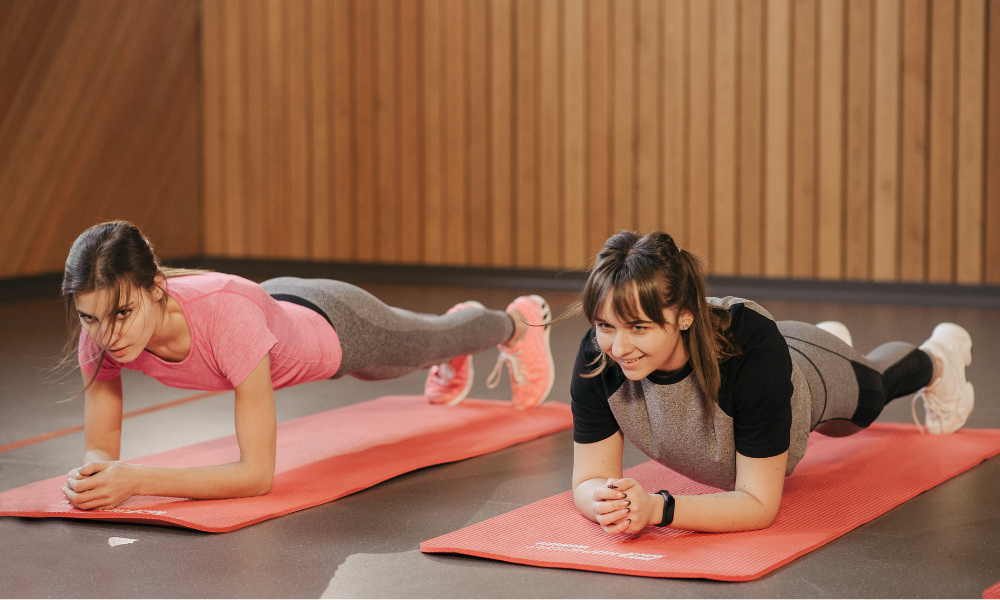Contents
- 1 Women’s Health and Fitness: Strength Unveiled: Embracing Resistance Training for Empowerment and Wellness
- 1.1 Understanding Resistance Training:
- 1.2 Benefits of Resistance Training:
- 1.3 Myths about Resistance Training for Women:
- 1.4 Fear of Bulking Up:
- 1.5 Risk of Injury:
- 1.6 The Role of Resistance Training in Weight Management:
- 1.7 Increasing Basal Metabolic Rate (BMR)
- 1.8 Preserving Lean Muscle Mass:
- 1.9 Resistance Training and Bone Health:
- 1.10 Improving Posture and Reducing Back Pain:
- 1.11 Empowerment and Mental Health:
- 1.12 Reducing Stress and Anxiety
- 1.13 Combining Resistance Training with Cardiovascular Exercise
- 1.14 Overcoming Challenges and Staying Motivated
- 1.15 Women and Strength: Changing Perceptions
Women’s Health and Fitness: Strength Unveiled: Embracing Resistance Training for Empowerment and Wellness
Introduction:
The significance of women’s health and fitness cannot be overstated, as they play a crucial role in promoting physical wellness and mental and emotional vigor. Recently, there has been a growing focus on the importance of resistance training to improve women’s general health. This essay explores the numerous advantages of resistance training, dispels prevalent misconceptions, and emphasizes its potential positive effects on women’s lives.

Understanding Resistance Training:
- Resistance training, also referred to as strength training or weightlifting, encompasses the execution of exercises designed to exert muscles through the application of resistance. Resistance can be provided through several means, such as free weights, machines, resistance bands, or even workouts that rely just on one’s body weight. The principal aim is to engage muscles in resistance against a stimulus that promotes growth and strength development.
Benefits of Resistance Training:
- Several positive outcomes are associated with resistance training for women’s health and fitness. Among the many advantages are:
- Regular resistance training increases muscle strength and endurance, which facilitates the execution of routine tasks.
- Better Calorie Burning: Resistance exercise helps boost your metabolism by increasing your BMR (basal metabolic rate).
- Resistance training helps with weight management because it encourages fat reduction while protecting lean muscle mass.
- Resistance exercise is essential for women to prevent bone loss and fractures because of the higher risk of osteoporosis.
- Resistance training promotes hormonal balance by improving hormone regulation, which in turn improves health.

Myths about Resistance Training for Women:
- Despite the well-documented advantages, several misconceptions persist regarding resistance training among women, frequently leading to their reluctance to engage in such activities.
Fear of Bulking Up:
- A prevalent fallacy is the notion that engaging in resistance training will result in women developing a bulky physique. Nevertheless, it is widely recognized that girls do not possess sufficient quantities of testosterone, which is essential for significant muscular development. Conversely, individuals experience the development of lean and well-defined musculature.
Risk of Injury:
- Another prevailing misconception about the apprehension of sustaining injuries during resistance exercise exists. When executed with correct technique and under adequate supervision, the likelihood of sustaining injuries is negligible, while the benefits significantly outweigh the potential dangers.

The Role of Resistance Training in Weight Management:
Increasing Basal Metabolic Rate (BMR)
- Resistance training has been found to positively impact basal metabolic rate (BMR), leading to an elevation in the number of calories expended by the body during periods of rest. This facilitates the ability of women to maintain their body weight efficiently.
Preserving Lean Muscle Mass:
- In contrast to crash diets, which have been associated with the potential loss of muscle mass, resistance exercise is known to effectively maintain and enhance lean muscle mass while concurrently facilitating the reduction of adipose tissue. This phenomenon contributes to a more aesthetically pleasing and physically fit appearance.

Resistance Training and Bone Health:
Osteoporosis and Women:
- Osteoporosis is a medical disorder that is characterized by a decrease in bone density and an increased susceptibility to fractures. This ailment primarily impacts women as they progress in age. Maintaining robust skeletal health necessitates the implementation of preventive measures.
Impact of Resistance Training on Bone Density:
- Research findings indicate that the inclusion of resistance training in a bone-strengthening routine is crucial due to its positive impact on bone density augmentation.
Hormonal Benefits of Resistance Training:
Balancing Hormones
- Resistance exercise has been found to positively impact hormone levels, specifically insulin, cortisol, and growth hormone, hence facilitating improved hormonal equilibrium.
Managing Menopause Symptoms:
- Resistance training has been found to have potential benefits for women through menopause since it may help decrease symptoms such as hot flashes and mood swings, ultimately boosting their overall quality of life.

Improving Posture and Reducing Back Pain:
Strengthening Core Muscles
- Resistance workouts involve the activation of core musculature, resulting in enhanced postural alignment and less stress on the lumbar region.
Alleviating Lower Back Pain
- Women with sedentary lifestyles or other contributing factors can effectively reduce their lower back pain by engaging in resistance training. This is achieved through the strengthening of the back muscles.

Empowerment and Mental Health:
Boosting Confidence
The attainment of fitness objectives through resistance training has been found to enhance an individual’s self-assurance and self-worth.
Reducing Stress and Anxiety
Physical activity, encompassing resistance training, has been well acknowledged for its ability to induce the production of endorphins, thus contributing to mitigating stress and anxiety.

Designing a Resistance Training Program:
Setting Goals
The establishment of precise and attainable objectives is of utmost importance in ensuring the efficacy of a resistance training regimen.
Creating a Workout Routine
Designing a comprehensive training regimen incorporating diverse activities aimed at various muscle groups promotes equitable advancement…
Nutrition and Recovery:
Importance of a Balanced Diet
The significance of nutrition is crucial in facilitating the body’s recuperation and promoting muscle growth.
Ensuring Adequate Rest
The process of rest and recovery is crucial in facilitating the repair and subsequent strengthening of muscles.
Combining Resistance Training with Cardiovascular Exercise
The Benefits of Cardiovascular Exercise
Cardiovascular exercise serves as a valuable complement to resistance training as it contributes to the improvement of heart health and the enhancement of overall fitness levels.
Finding the Right Balance
The integration of weight training and cardiovascular exercise is essential for attaining optimal fitness goals.

Overcoming Challenges and Staying Motivated
Dealing with Plateaus
It is a frequent occurrence to confront plateaus while making progress; nevertheless, with persistent effort and determination, these obstacles can be successfully surmounted.
Celebrating Progress
Recognizing and commemorating accomplishments throughout the process of pursuing physical fitness aids in maintaining motivation.
Safety Precautions and Injury Prevention
Using Proper Form and Technique
Ensuring proper form and technique is crucial to minimizing the risk of accidents and optimizing outcomes.
Listening to Your Body
The act of attentively perceiving and interpreting the physiological cues sent by the human body while concurrently refraining from engaging in excessive training is paramount in achieving sustained success over an extended period.

Women and Strength: Changing Perceptions
Breaking Stereotypes
Highlighting the power and aptitude of women serves as a means to confront and question prevailing societal assumptions.
Inspiring Others
Women in resistance training serve as influential figures, motivating and encouraging others to initiate their endeavors toward physical fitness.
Essential Minerals and Vitamins for Women’s Fitness Goals and Resistance Training: A Guide to a Balanced Diet”
Women who want to achieve their fitness goals and get the most out of resistance training would do well to prioritize eating a healthy, well-rounded diet.
The following minerals and vitamins are essential parts of a balanced diet for women who regularly engage in resistance training and who wish to maintain a fit and trim appearance:
Protein: Muscles need protein for building and repairing themselves. Lean protein from foods like chicken, fish, tofu, beans, and lentils aids in muscle growth and repair after exercise.
Calcium: The essay highlights the significance of resistance training in preserving bone health and warding off osteoporosis. Bone density can be improved by consuming calcium-rich foods such as dairy, leafy greens, and fortified plant-based milk.

Vitamin D: Bone health and calcium absorption are greatly aided by vitamin D. It is possible to get enough vitamin D by spending time in the sun and eating vitamin D-rich foods like fatty fish, fortified dairy products, and egg yolks.
Iron: Getting enough iron is crucial for keeping your strength and health strong. Because of menstruation, iron needs may be higher in women than in men. Red meat, spinach, lentils, and iron-fortified cereals are all good places to get your iron fix.
Magnesium: Magnesium is essential for healthy muscles and for creating energy. Magnesium-rich foods include nuts, seeds, whole grains, and dark green vegetables.
B Vitamins: Foods like meat, fish, dairy products, and leafy greens are good sources of B vitamins, which help the body convert food into energy.
Vitamin C: Producing collagen, which is essential for healthy skin and connective tissues, requires vitamin C. Vitamin C is abundant in foods like citrus fruits, strawberries, and bell peppers.
Omega-3 Fatty Acids: These beneficial fats are anti-inflammatory and good for the heart. Omega-3 fatty acids can be found in fatty fish, flaxseeds, and walnuts.
Potassium: Bananas, sweet potatoes, and beans are all good sources of potassium, which is essential for healthy muscle function.
Final Words
In summary, resistance training is important for women’s health and fitness. It provides many advantages, encompassing heightened muscular strength, enhanced skeletal density, equilibrium of hormones, and augmented psychological welfare. Through dispelling fallacies and correcting misunderstandings, women can effectively adopt resistance training as a potent means to enhance their holistic well-being.









